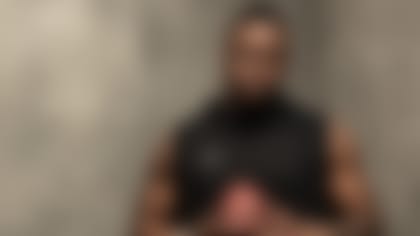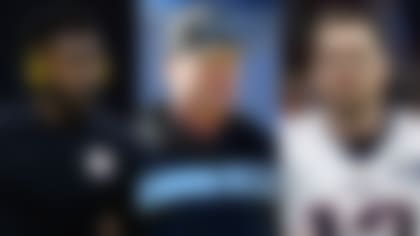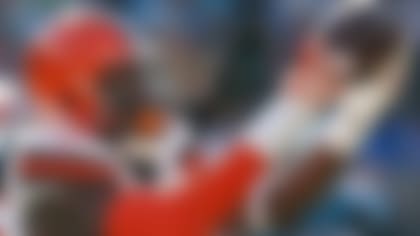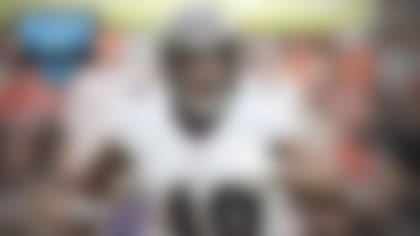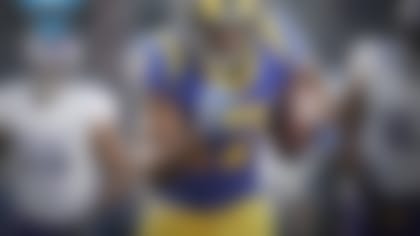NFL Media's Oklahoma Drill series presents exclusive, quick-hitting one-on-one interviews with players and coaches from around the league. No nonsense -- just football experiences directly from the source.
Mike Haynes
Cornerback, Retired
Born: July 1, 1953
Experience: 14 NFL seasons
Interview by Brooke Cersosimo | June 1, 2016
I love Darrelle Revis. The first time I saw him play was against the San Diego Chargers, and it was a playoff game. I could not believe his athletic ability, and his ability to make plays just blew me away. I remember thinking Wow! It's really cool to see a guy that talented in the league.
It took somebody to come tell me, "Hey, have you seen that guy Josh Norman play?" But when I saw him play, I saw that he's fast, he can jump and run. If he gets the ball, he's a threat to score. I don't know why they don't put him at punt returner or kick returner or give him more stuff to do.
I'm a Hall of Fame football player and I can't tell my kids anything. I can say, "Hey, you need to get more zip on the ball," and they won't listen. But if somebody says it, it's like, "Oh, that's good advice."
I think the guy who I'd most want to play against just retired. Guys like Calvin Johnson or Randy Moss, those kind of guys. It would've been fun because they are tall and fast. The player that gave me the most trouble was Harold Carmichael, and he was just tall, like 6-8. I mean, Randy Moss was like a deer and so was Megatron.
My challenges in those days were guys like James Lofton, Jerry Rice and Cris Carter. But I can't imagine someone taller and faster, way faster. It's scary to think about.
The main thing that we had that a lot of corners don't have all the time is a great pass rush. We had a young Howie Long, Greg Townsend, Ted Hendricks, Reggie Kinlaw, Rod Martin, Mike Davis, and we had a defensive coordinator who liked to blitz. His whole thing was I don't care if it's third-and-20, we're going after their ass. That's the kind of mentality that he had, so that's the kind of mentality we had.
We felt like we were playing offense but on defense. If you get a pick or a fumble, take it to the house. It was just a lot of fun to play in that environment.
I was a quiet guy, believe it or not. But my counterpart, Lester Hayes, he would challenge people and say things like, "Those little smurfs. They'll be lucky if they catch a pass on us." He challenged them and that made me play at a higher level, because I knew those receivers and quarterback were really trying their best that day to get in the end zone on us.
I think back on one receiver that caught one pass for six yards and he slammed it down like it was a touchdown. Like Take that! I was like Wow 'cause it was a big deal for him. I had no idea it was like that.
Even now, I talked to Andre Reed, who's in the Hall of Fame, about stories. He'd tell about how he felt when he played the Raiders and how his two or three passes were a huge deal. It's amazing that guys will feel that way because it sticks out in their mind but didn't ring in my mind at all.
[I see myself in some cornerbacks] maybe in the way that they play, not the way they talk.
I met Richard Sherman at a Super Bowl and we were doing a show together. I got a chance to talk to him, and I didn't really know the type of player he was, but our paths were similar. We were both receivers, both tall. I go to Seattle every year and play in a golf tournament, and Pete Carroll used to invite all the DBs out and say, "See how tall he is?" A lot of guys think, you know, if you're tall, you can't be fast. Or that the best defensive backs must be 5-foot-11 to 6 feet or something. If you're 6-3, you got no shot.
Mel Blount was the first cornerback I ever saw. That guy is a giant. He's 6-4, 200-something pounds. So I enjoy watching all the players, but I associate the most with the [Richard Sherman-type players] and the guys who have my body type.
Growing up in L.A., I used to see the Rams players around. Terry Nelson at the movies, and I used to see Deacon Jones at the barber shop. You see these guys around the town and they would always be encouraging kids to stay in school or go to college, and a lot of kids need that.
My rookie year was the first year the Tampa Bay Buccaneers and Seattle Seahawks came into the NFL. They were going to get the first two picks and I did not want to get picked to one of them because of the pressure.
I didn't want to be the first drafted player in the team's history and a rookie and a defensive back. The first time I had a bad play, it would be all over the country. I wanted to play on a team that had a good record. Well, the Patriots were not a good team and won three games the year before I was drafted, but we only lost three games my first year.
[My first] preseason was tough for me. Every single receiver on our team beat me on one drill that we had, and I was just so frustrated. I couldn't imagine being a rookie starter in Seattle or Tampa.
The first game we had against the Baltimore Colts, I got beat for a touchdown to lose the game, first game of the season. This was Boston, so everybody's saying, "What a waste!" or "You wasted a draft pick on him!" or "Who the hell is he?" These weren't Kansas City fans or Denver fans.
We were playing on national TV in a Monday night game against the Jets, and I was doing exactly what they told me to do but I was getting beat like a drum. I was driving to the ball and making tackles, but the chains still moved because it was a catch.
I'm like, "Hey, I'm just doing my job." No coach was coming up to me telling me I was doing a good job or protecting me. I thought, Man, this is a job now.
The best thing that could've happened was my coach said, "Hey, Mike. I taught you everything I can. You know the system and you know what your strengths and weaknesses are in the defense. Just use your help and be smart." That allowed me to be me. That's when my career kind of took off.
Our campaign [Know Your Stats] is about the importance for early detection [of prostate cancer]. One in seven men will be diagnosed with prostate cancer during their lifetime. If you're African American, it's one in five. If it runs in your family, it's one in three. It's important for men to know their family history and what the tests are about. We're trying to make a difference and encourage men to talk about prostate cancer. For survivors, like me, to get the word out.
I could imagine [playing football after surviving cancer]. When you hear the "cancer" word, we always think death. I don't know why we do that, maybe from movies or something. I think there are a lot of guys [like Eric Berry] who want to live as normal a life as possible and keep following their dreams as much as they can.
It's between Joe Montana and Dan Marino. I don't know which one is better. And Dan Fouts. The great quarterbacks were the ones that challenged me. John Elway, too, when I think about it. All the ones who did great that I really worked hard against are all in the Hall of Fame. It's kind of crazy.
I was talking to John Elway at a restaurant in Hawaii during the Pro Bowl, and I said, "John, you have a killer arm dude. You can throw the ball a country mile, but you don't have anybody to throw the ball to that can run a country mile." Butch Johnson was a great player, but John needed somebody who can go get it. So the Broncos drafted Vance Johnson, freaking speed demon.
John [told the media], "I was talking to Mike Haynes and Mike said I needed to get somebody who could go deep." Al Davis saw it and called me at home and said, "Mike, it's tough enough to beat these guys without helping them." That was the only time Al Davis got mad at me.
Then they got Ricky Nattiel and Mark Jackson. That's when they started the "Three Amigos."
